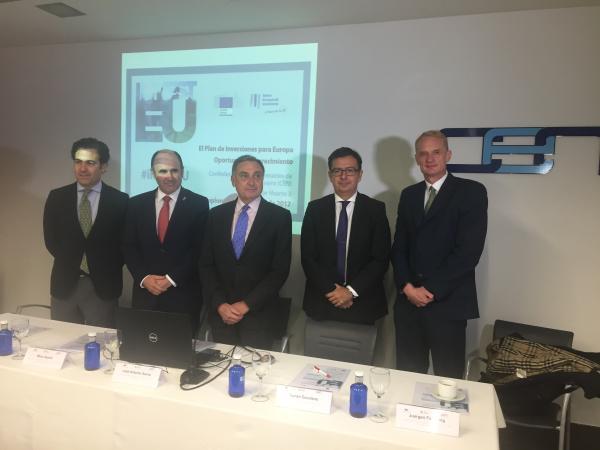
The Investment Plan for Europe was launched in 2015 with the aim of helping investment, providing visibility to projects, granting them technical assistance and ensuring that funds reach the real economy. It is expected to mobilise investment of at least EUR 315bn by 2018. EIB Vice-President Román Escolano, Instituto de Crédito Oficial Chairman Pablo Zalba, and Deputy Head of the Representation of the European Commission in Spain Juergen Foecking gave detailed explanations this morning. “We are working to improve the business climate in Europe with the Energy Union, Capital Markets Union and Digital Single Market projects. The Investment Plan offers companies a major opportunity to boost their business,” said Juergen Foecking.
How to present projects
At this event, which was supported by the Confederación de Empresarios de Navarra, the Europe Direct Cederna Garalur centre, the Asociación de la Industria Navarra, the University of Navarra, and the Enterprise Europe Network (EEN), business people and managers from various economic sectors and institutions asked how to present projects and gain access to financing. Businesses in Navarra can choose to receive Investment Plan for Europe financing via the European Fund for Strategic Investments (EFSI). “There are several ways to access the financing. If the project is for over EUR 25m, the EIB can normally be contacted directly. If the specified investment is for less than this figure, the company can get in touch with the financial entities that have signed an agreement with the EIB,” explained Román Escolano. The EU bank Vice-President also highlighted “the large-scale implementation of the Juncker Plan in Spain. The EIB has already supported almost 60 projects across the country that will make it possible to invest more than EUR 28.7bn in the Spanish economy.”
ICO Chairman Pablo Zalba emphasised “ICO's firm commitment to the Investment Plan for Europe through the co-financing of projects of Spanish national interest selected beforehand by the European Fund for Strategic Investments, the financial pillar of the plan. We will continue to provide our experience to help more companies to develop their projects with this initiative.”
On the hunt for business innovation
A lack of funds is one of the biggest problems affecting SMEs. The Investment Plan for Europe is trying to solve this issue. Most of the projects financed will make it possible to promote innovation and sustainable production in all sectors of the Spanish economy. This plan is aimed at SMEs, midcaps and large companies with the goal of supporting their competitiveness and creating jobs.
Access to funding will enable businesses in Navarra to grow
99.84% of companies in Navarra are small and medium-sized enterprises (SMEs). Of the 42 915 SMEs in the region, 54.08% are active in the services sector, 22.74% in commerce, 14.25% in construction and 8.92% in industry. Most businesses in Navarra are centred on commerce and hospitality, while there are 6 126 companies in the construction sector.
Objective: mobilise EUR 315bn across the EU
Since the Investment Plan for Europe's launch in 2015, 59 operations have been approved in Spain for a total financing amount of EUR 5bn, which is expected to provide investment of EUR 28.7bn in the Spanish economy. Across the EU, the EIB Group has approved 618 projects for a total investment amount of more than EUR 46bn, which will mobilise EUR 236bn in investment. The aim of the Investment Plan for Europe is to mobilise investment of EUR 315bn in the EU economy by 2018.
The Investment Plan for Europe focuses its investments on strategic infrastructure (such as digital and transport), research and innovation, education, the development of renewable energies, resource efficiency, and support for SMEs.
This seminar is part of a series of events to take place in various Spanish cities over 2017. Organised by the Representation of the European Commission in Spain and the EIB, they will explain to business people – region by region – how they can present their projects and secure the financing they need to stimulate the economy and jobs in their area.

Photographer: Mercedes Landete ©EIB
Download original